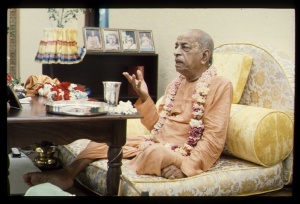SB 2.9.42: Difference between revisions
No edit summary |
(Vanibot #0054 edit - transform synonyms into clickable links, which search similar occurrences) |
||
| Line 23: | Line 23: | ||
<div class="synonyms"> | <div class="synonyms"> | ||
''māyām'' | ''[//vanipedia.org/wiki/Special:VaniSearch?s=māyām&tab=syno_o&ds=1 māyām]'' — energies; ''[//vanipedia.org/wiki/Special:VaniSearch?s=vividiṣan&tab=syno_o&ds=1 vividiṣan]'' — desiring to know; ''[//vanipedia.org/wiki/Special:VaniSearch?s=viṣṇoḥ&tab=syno_o&ds=1 viṣṇoḥ]'' — of the Personality of Godhead; ''[//vanipedia.org/wiki/Special:VaniSearch?s=māyā&tab=syno_o&ds=1 māyā]-[//vanipedia.org/wiki/Special:VaniSearch?s=īśasya&tab=syno_o&ds=1 īśasya]'' — of the master of all energies; ''[//vanipedia.org/wiki/Special:VaniSearch?s=mahā&tab=syno_o&ds=1 mahā]-[//vanipedia.org/wiki/Special:VaniSearch?s=muniḥ&tab=syno_o&ds=1 muniḥ]'' — the great sage; ''[//vanipedia.org/wiki/Special:VaniSearch?s=mahā&tab=syno_o&ds=1 mahā]-[//vanipedia.org/wiki/Special:VaniSearch?s=bhāgavataḥ&tab=syno_o&ds=1 bhāgavataḥ]'' — the first-class devotee of the Lord; ''[//vanipedia.org/wiki/Special:VaniSearch?s=rājan&tab=syno_o&ds=1 rājan]'' — O King; ''[//vanipedia.org/wiki/Special:VaniSearch?s=pitaram&tab=syno_o&ds=1 pitaram]'' — unto his father; ''[//vanipedia.org/wiki/Special:VaniSearch?s=paryatoṣayat&tab=syno_o&ds=1 paryatoṣayat]'' — very much pleased. | ||
</div> | </div> | ||
Latest revision as of 21:22, 17 February 2024

A.C. Bhaktivedanta Swami Prabhupada
TEXT 42
- māyāṁ vividiṣan viṣṇor
- māyeśasya mahā-muniḥ
- mahā-bhāgavato rājan
- pitaraṁ paryatoṣayat
SYNONYMS
māyām — energies; vividiṣan — desiring to know; viṣṇoḥ — of the Personality of Godhead; māyā-īśasya — of the master of all energies; mahā-muniḥ — the great sage; mahā-bhāgavataḥ — the first-class devotee of the Lord; rājan — O King; pitaram — unto his father; paryatoṣayat — very much pleased.
TRANSLATION
Nārada very much pleased his father and desired to know all about the energies of Viṣṇu, the master of all energies, for Nārada was the greatest of all sages and greatest of all devotees, O King.
PURPORT
Lord Brahmā, being the creator of all living beings in the universe, is originally the father of several well-known sons, like Dakṣa, the catuḥ-sanas, and Nārada. In three departments of human knowledge disseminated by the Vedas, namely fruitive work (karma-kāṇḍaItalic text), transcendental knowledge (jñāna-kāṇḍa), and devotional service (upāsanā-kāṇḍa), Devarṣi Nārada inherited from his father Brahmā devotional service, whereas Dakṣa inherited from his father fruitive work, and Sanaka, Sanātana, etc., inherited from their father information about jñāna-kāṇḍa, or transcendental knowledge. But out of them all, Nārada is described here as the most beloved son of Brahmā because of good behavior, obedience, meekness and readiness to render service unto the father. And Nārada is famous as the greatest of all sages because of his being the greatest of all devotees. Nārada is the spiritual master of many famous devotees of the Lord. He is the spiritual master of Prahlāda, Dhruva and Vyāsa, down to the forest animal hunter Kirāta. His only business is to turn everyone to the transcendental loving service of the Lord. Therefore all these features of Nārada make him the dearmost son of his father, and all this is due to Nārada's being a first-class devotee of the Lord. The devotees are always anxious to know more and more about the Supreme Lord, the master of all energies. As confirmed in the Bhagavad-gītā (BG 10.9):
- mac-cittā mad-gata-prāṇā
- bodhayantaḥ parasparam
- kathayantaś ca māṁ nityaṁ
- tuṣyanti ca ramanti ca
The Supreme Lord is unlimited, and His energies are also unlimited. No one can know them completely. Brahmājī, being the greatest living entity within this universe and being directly instructed by the Lord, must know more than anyone within this universe, although such knowledge may not be complete. Thus it is the duty of everyone to ask about the unlimited Lord from the spiritual master in the disciplic succession of Brahmā, which descends from Nārada to Vyāsa, from Vyāsa to Śukadeva and so on.